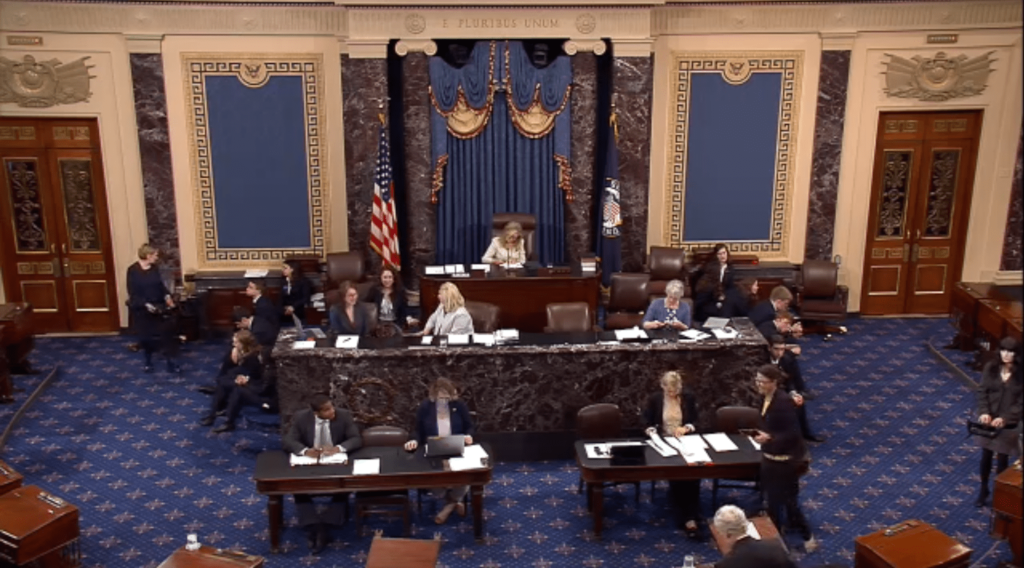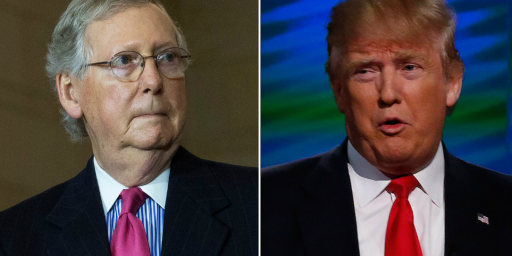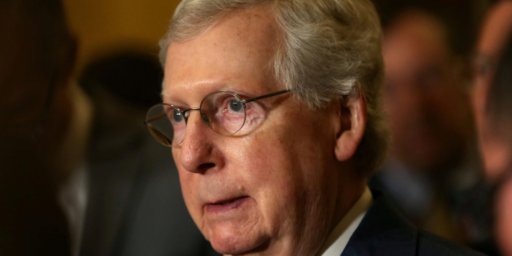The Do Nothing Senate
Other than confirming a lot of Trump Judges, the Senate has not been getting much work done so far this year.

Josh Israel at Think Progress notes that the Senate hasn’t even pretended to do much in the way of legislative work so far this year, and there are few signs that this is going to change significantly:
Despite several campaign promises to change the way Congress legislates and get things done, the U.S. Senate, under the leadership of Majority Leader Mitch McConnell (R-KY), has not had a recorded vote on a bill in more than a month.
Instead, the Senate on Thursday was considering the nomination of Michael H. Park for a lifetime appointment to the be a federal judge. On Wednesday, it voted to confirm President Donald Trump’s nominees for the Equal Employment Opportunity Commission, the Export-Import Bank, and another circuit court judgeship.
A ThinkProgress review of the Senate’s roll call votes reveals that, since an April 1 cloture vote on an appropriations bill, the chamber has devoted virtually all of its roll call votes to confirmation of Trump appointees. With very few exceptions, the Senate’s floor schedule is subject to the sole discretion of the majority leader.
On April 2 and 3, McConnell rammed through a rule change — using a procedural maneuver he previously decried as a way for the majority to “break the rules to change the rules” — to reduce the time allowed for debate before confirmation votes. Since then, the body has confirmed 11 lifetime judgeships and 11 executive branch nominees. The sole remaining vote — an unsuccessful attempt to override Trump’s veto of a resolution to block the president’s use of military force in Yemen — was “privileged,” meaning that it could be considered without McConnell’s approval.
Senate Democrats have noticed that the place McConnell once called “the greatest deliberative body in the world” has stopped deliberating about appropriations, immigration, health care, gun violence, infrastructure, entitlements, and everything else.
“Three times a week the Senate Republicans meet for lunch. … And occasionally they walk into that chamber and take a vote or two or three on judges. That is the sum total of the Senate’s work today,” Sen. Chris Murphy (D-CT) told reporters in late April. “Mitch McConnell has effectively turned the United States Senate into a very expensive lunch club.”
A video released Tuesday by the Senate Democrats similarly notes that the Republican majority has turned the chamber into a “legislative graveyard.”
As Israel notes, this is not what many of the Republicans who entered the Senate in the wake of the 2018 elections ran on:
Sen. Kevin Cramer (R-ND), who ousted Democratic Sen. Heidi Heitkamp in November, laid out a very different agenda as a candidate. “One vote does matter,” he said at his party’s convention, noting “border security, sanctuary cities and the rule of law, regulatory reform, economic security, job creation” and “the basic human right to life” as policy areas he hoped to influence if elected.
Cramer on Thursday defended the Senate’s legislative inaction, saying, “Since I joined the Senate in January, we have taken consequential votes on immigration, energy, the economy, and the sacred right to life. While we debate these policies, the Senate is also in the personnel business.”
He also complained of a “judicial vacancy crisis” left by former President Barack Obama, saying he “support[ed] Leader McConnell’s efforts to fix this crisis and to ensure radical, socialist policies passed by the House never become law.”
Sen. Mike Braun (R-IN), who ousted Democratic Sen. Joe Donnelly, also proposed a conservative legislative agenda as candidate. His proposals — still listed on his campaign site — included bills to “[m]ake the Trump tax cuts permanent and continue simplifying the tax code,” to “[i]nvest wisely into improving infrastructure, in both urban and rural communities,” to “enact national reciprocity [gun] laws and protect the rights of sportsmen on federal lands,” to enact term limits, and to expand lobbying restrictions for former lawmakers.
Sen. Martha McSally (R-AZ), who lost her 2018 race but was then appointed to fill the remainder of John McCain’s term, ran claiming to have “what it takes not only to win, but to get things done in D.C.” In her campaign kickoff victory, she claimed that she was running to “fight the fights that must be won on national security, economic security, and border security.”
On some level, of course, it isn’t surprising that there’s very little legislative activity going on in the Senate right now. In part, it’s due to the fact that we have a divided Congress with Democrats controlling the House and Republicans controlling the Senate. This means that many of the measures that have passed the House have gone nowhere in the Senate and would likely die either in Committee or on the floor if they were brought forward for consideration. Indeed, this is something that has been generally true in the past when there is a divide in control of the respective chambers of Congress.
Additionally, the Senate rules are unique in that they give the majority party, in the person of the Majority Leader, enormous power in determining the business of the Senate. If Mitch McConnell decides that a given measure isn’t going to make it to the floor then that measure is effectively dead. Additionally, the Majority Leader is able to limit the ability of the minority party to present alternatives by limiting the number of amendments that can be presented for a vote. While the majority in the House has similar powers, the rules in that body make it at least theoretically possible that measures that aren’t supported by the House GOP Leadership are given a floor vote. That’s much harder to accomplish in the Senate.
Another reason for the lack of legislative work in the Senate is the fact that, well, there hasn’t been a whole lot of legislation for the Senate to vote on. Sure, the House has passed a few measures that Democrats promised during the campaign that have gone on to die in the Senate as everyone expected they would. By and large, though, the past four months or so have not seen much legislative action in either body of Congress and most of what has passed has been stuff that is either non-controversial, meaning that it has generally passed the Senate on a voice vote with little or no debate, or routine. For all the talk, there is no major piece of legislation out there and other than the necessary budget bills that need to be passed by September 30th. If there’s not much to vote on or debate, there’s not going to be a lot for the Senate to do.
The final factor, of course, is the fact that the Senate has been almost single-mindedly focused on the President’s judicial nominees. As of May 9th, the Senate has confirmed 104 Trump Judges, including two Supreme Court Judges, 39 Judges to the Circuit Courts of Appeal, and 63 to U.S. District Courts. Beyond these confirmations, there are many more nominations waiting in the wings to be confirmed that will allow that number to increase. (Source) This averages out to roughly 43 Judicial confirmations per year for Trump’s Presidency to date. This is slightly ahead of the roughly 40 Judges per year that were confirmed during President Obama’s Presidency (Source) and President George W. Bush’s Presidency (Source). During his eight years in office, President Clinton averaged roughly 47 Judicial confirmations over his eight years in office (Source), George H.W. Bush averaged 48 confirmations during his time in office (Source), and Ronald Reagan averaged 47 confirmations. (Source) Perhaps most significant, though, is the fact that Trump in his two years has appointed nearly as many Judges to the Circuit Courts of Appeal as his five most immediately predecessors during their entire time in office. And McConnell seems committed to fast-tracking as many nominations as he can before the 2020 election.
In any case, it’s possible that the idea of a “do nothing” Senate is something that the Democrats might be able to run on in 2020, especially in some purple states such as Arizona where they seem to have a decent chance of flipping a seat. To be honest, though, I’m not sure how effective that will be absent something specific to rally behind. If the House were to pass some hugely popular legislation that the Senate blocked or, taking a page from the Merrick Garland playbook, simply ignored then it’s possible that Democratic Senate candidates can use against the incumbents they are running against. Beyond that, I’m not sure that the fact that a Republican-controlled Senate and Democratic-controlled House aren’t getting much done is going to surprise many people or motivate them to vote.






Hacker and Pierson in Winner Take All Politics talk about the concept of “drift”. The idea is that it’s people who are disadvantaged by the status quo who want change, who want things to happen. People who are sitting pretty like the status quo. They want things to NOT change. They want things to coast along as they are. Drift.
The Koch Bros want tax cuts and regulatory relief. They were able to get their tax cuts while we had a GOP House and they’re OK for a while. And they can get a lot of regulatory relief from the administration. Mostly, they want no one to do anything about AGW, and they’re succeeding. Sheldon Adelson wants tax cuts and support for Netanyahu and Likud. Again, he’s set for a while on taxes and he’s getting what he wants on Israel from Trump. They, and their ilk, want Congress to do nothing. And they’ve largely been able to buy what they want.
Delay in meeting Constitutionally mandated oversight pushes these matters into 2020, a dangerous proposition for the GOP. McConnell, Gardner, and Collins are all under water already. The tax cut cost practically everyone I know money they do not have to spend. Court-packing is not a policy and replaces not even one millimeter of crumbling infrastructure.
On what, exactly, is the GOP going to run? Beware the “no one’s paying attention” meme from last millennium. The U.S. was willing to gamble on Trump given the known alternative, and that did not happen in just the six weeks leading up to 2016.
Absent impeachment, it’s the Democrat’s argument to lose in 2020. The real crisis begins once the President defies a court order for subpoenaed materials. We are not there yet. Maybe by the Fourth of July…
More accurately: the do-nothing Republicans. The problem, for me, is this: there isn’t a public mandate for do-nothingism, but the structure of the Senate empowers the minority who does want little done. This is anti-democratic. If there was public sentiment for do-nothingism, I personally might not like it, but at least our governing institutions would be reflecting overall public sentiment.